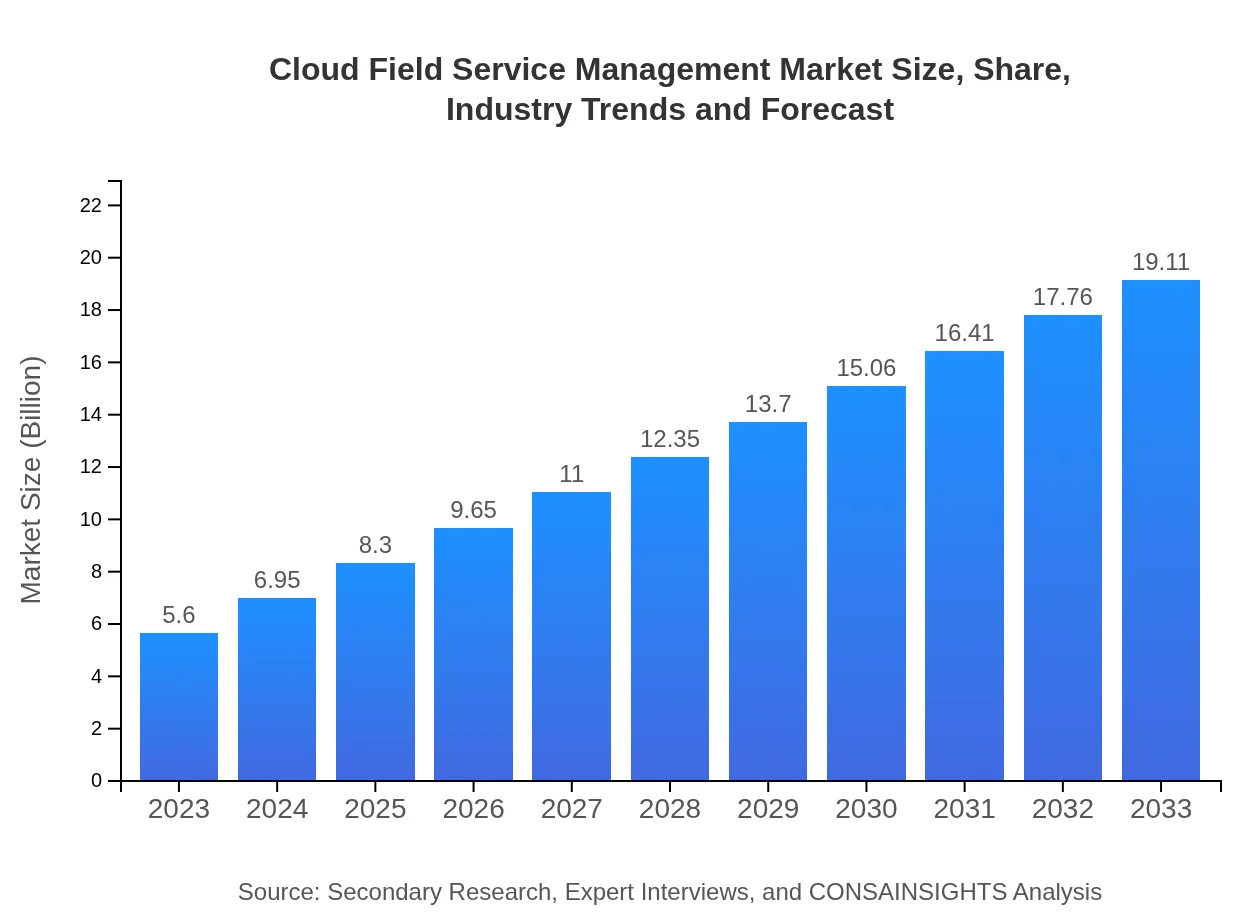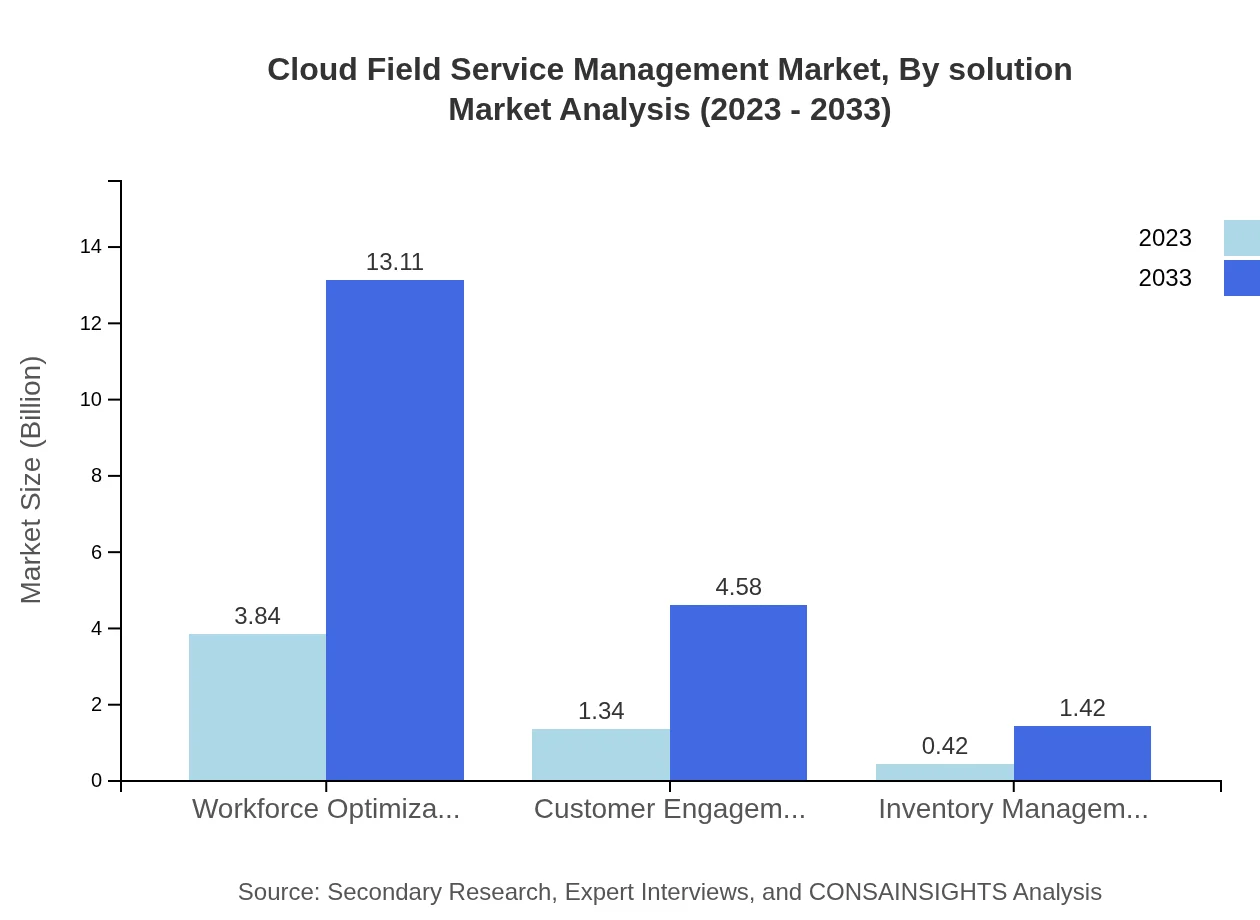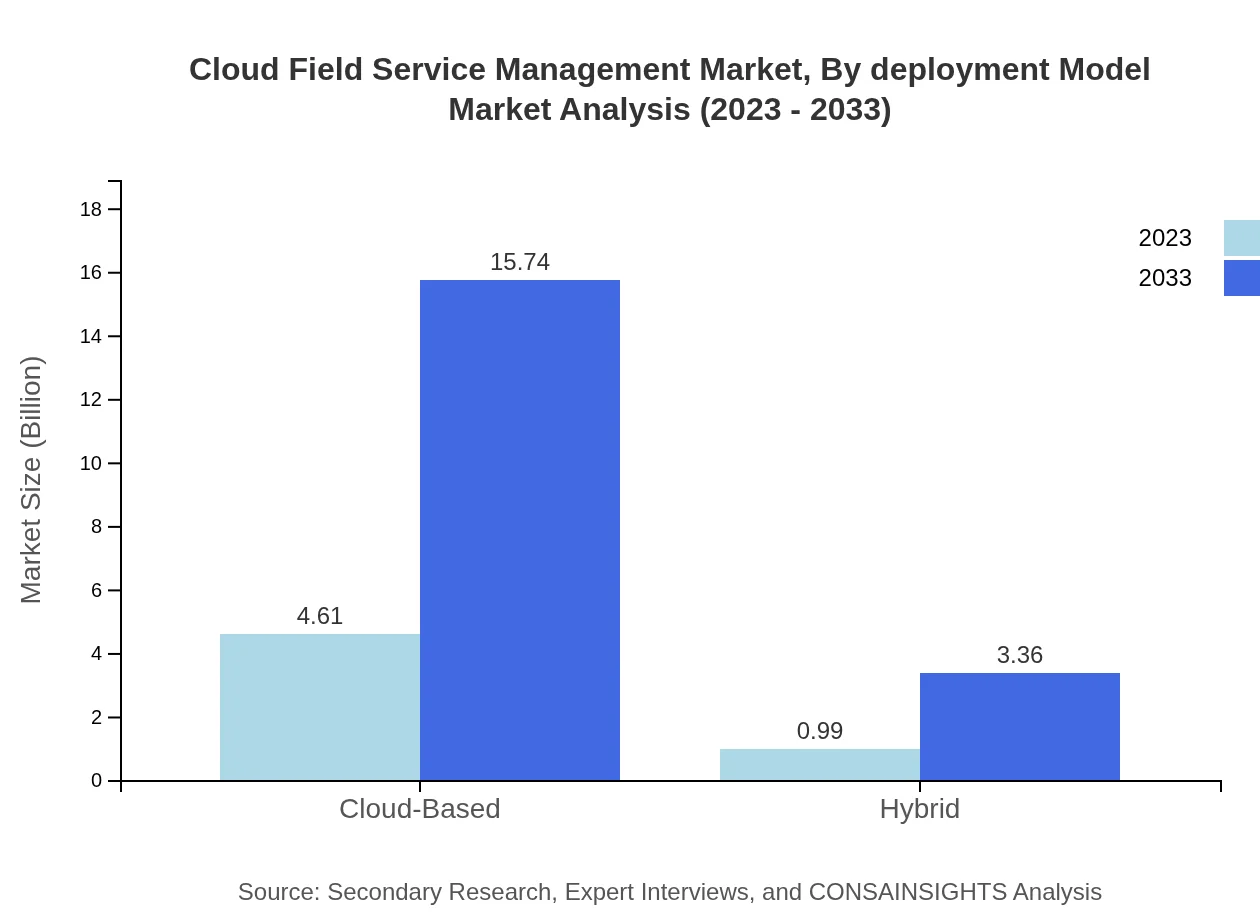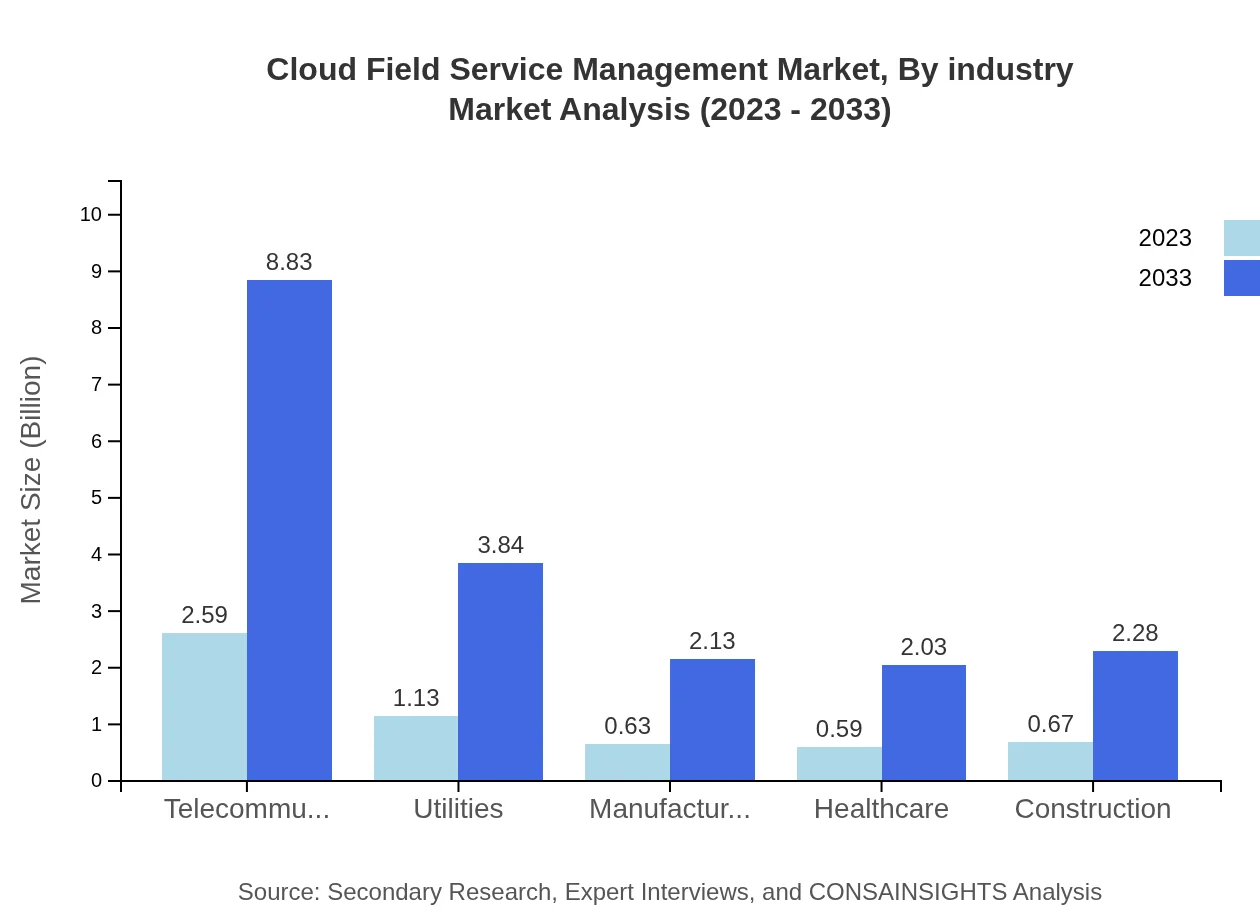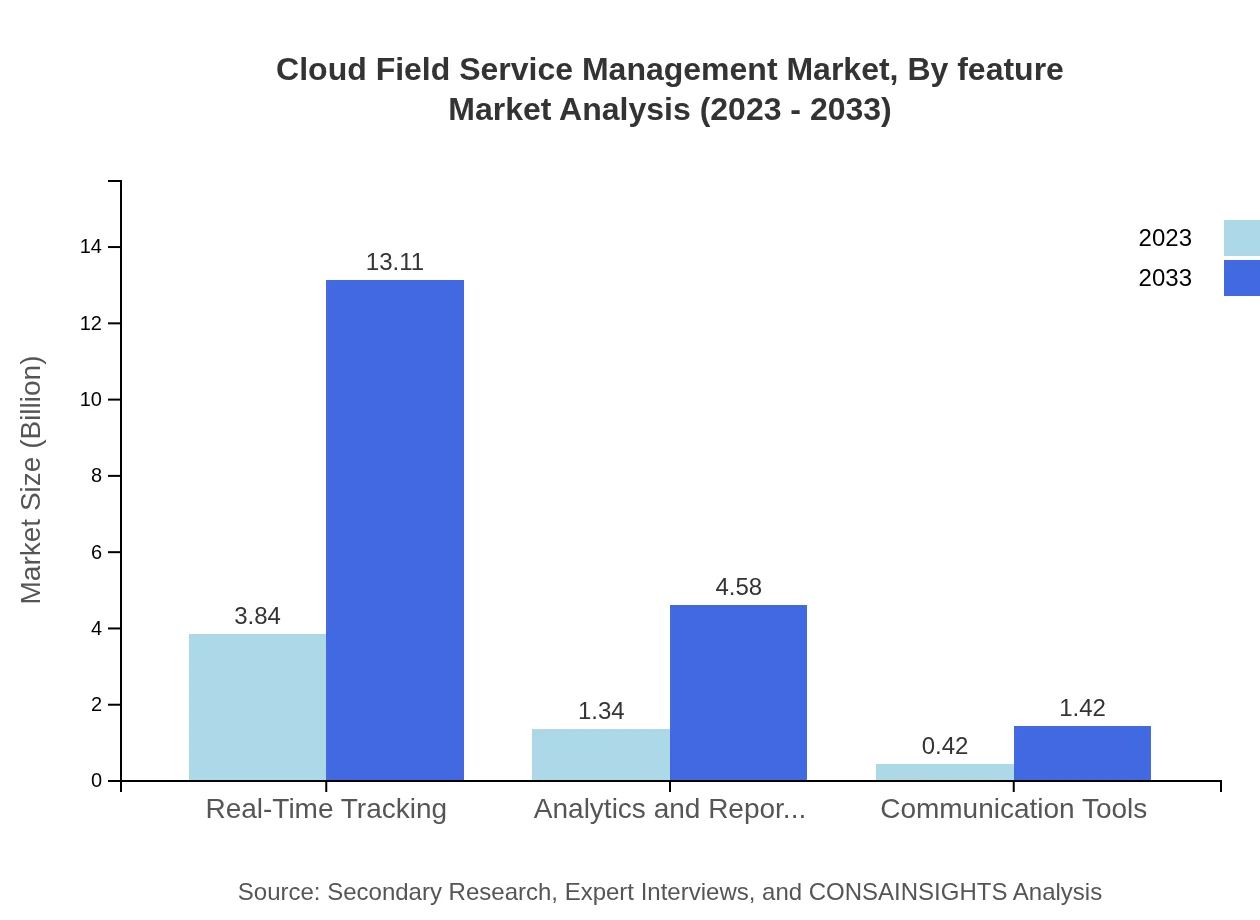Cloud Field Service Management Market Report
Published Date: 31 January 2026 | Report Code: cloud-field-service-management
Cloud Field Service Management Market Size, Share, Industry Trends and Forecast to 2033
This report provides a comprehensive analysis of the Cloud Field Service Management market, covering market size, trends, regional insights, and forecasts up to 2033. It aims to equip stakeholders with essential data and insights needed to make informed decisions.
| Metric | Value |
|---|---|
| Study Period | 2023 - 2033 |
| 2023 Market Size | $5.60 Billion |
| CAGR (2023-2033) | 12.5% |
| 2033 Market Size | $19.11 Billion |
| Top Companies | Salesforce, Microsoft, SAP, Oracle, ServiceMax |
| Last Modified Date | 31 January 2026 |
Cloud Field Service Management Market Overview
Customize Cloud Field Service Management Market Report market research report
- ✔ Get in-depth analysis of Cloud Field Service Management market size, growth, and forecasts.
- ✔ Understand Cloud Field Service Management's regional dynamics and industry-specific trends.
- ✔ Identify potential applications, end-user demand, and growth segments in Cloud Field Service Management
What is the Market Size & CAGR of Cloud Field Service Management market in 2023?
Cloud Field Service Management Industry Analysis
Cloud Field Service Management Market Segmentation and Scope
Tell us your focus area and get a customized research report.
Cloud Field Service Management Market Analysis Report by Region
Europe Cloud Field Service Management Market Report:
Europe's Cloud FSM market is set to expand from $1.76 billion in 2023 to $6.02 billion by 2033. The demand for improved customer engagement and operational effectiveness is compelling companies to adopt FSM solutions, underpinned by regulatory requirements and a growing emphasis on sustainability initiatives.Asia Pacific Cloud Field Service Management Market Report:
The Cloud FSM market in Asia Pacific is projected to grow from $1.05 billion in 2023 to $3.59 billion by 2033, reflecting a strong emphasis on digital transformation and operational efficiency among businesses. The rapid adoption of cloud technologies and the increasing number of field service businesses are central to this growth, alongside the support of government initiatives promoting IT investments.North America Cloud Field Service Management Market Report:
North America commands a significant share of the Cloud FSM market, with a forecasted increase from $2.01 billion in 2023 to approximately $6.87 billion by 2033. The region is characterized by the rapid adoption of advanced technologies, strong investment in digital transformation initiatives, and a competitive landscape of established vendors driving market growth.South America Cloud Field Service Management Market Report:
In South America, the Cloud FSM market is projected to grow modestly from $0.05 billion in 2023 to $0.16 billion in 2033. This growth is spurred by the rising need for efficient resource management and service delivery solutions in the region, particularly among emerging companies seeking to enhance their operational capabilities.Middle East & Africa Cloud Field Service Management Market Report:
In the Middle East and Africa, the market is expected to rise from $0.72 billion in 2023 to $2.46 billion by 2033. The region shows promising growth potential with ongoing infrastructure developments and the increasing shift toward cloud-based solutions among service providers looking to enhance efficiency.Tell us your focus area and get a customized research report.
Cloud Field Service Management Market Analysis By Solution
The Real-Time Tracking solution dominates the FSM market, slated to grow from $3.84 billion in 2023 to $13.11 billion by 2033, capturing a substantial market share of 68.62%. Analytics and Reporting services are expected to expand from $1.34 billion to $4.58 billion, with a 23.95% share. Other notable segments include Telecommunications, which will grow from $2.59 billion to $8.83 billion (46.19% share), and Customer Engagement, projected to increase from $1.34 billion to $4.58 billion (23.95% share), highlighting the crucial role of these solutions in enhancing service operations.
Cloud Field Service Management Market Analysis By Deployment Model
The Cloud-Based model holds the lion's share of the market, set to grow from $4.61 billion in 2023 to $15.74 billion by 2033, maintaining a remarkable 82.39% market share. Hybrid models also exhibit growth potential, increasing from $0.99 billion to $3.36 billion (17.61%). This scenario underscores the growing preference for scalable, flexible, and low-cost deployment options among businesses globally.
Cloud Field Service Management Market Analysis By Industry
Among industries, Workforce Optimization stands out, with growth from $3.84 billion to $13.11 billion and a commanding share of 68.62%. Utilities and Healthcare follow, expanding from $1.13 billion to $3.84 billion and $0.59 billion to $2.03 billion, respectively, accounting for 20.12% and 10.6%. The Construction sector is also notable, increasing from $0.67 billion to $2.28 billion, with an 11.92% market share, reflecting the diverse applications of Cloud FSM in various operational contexts.
Cloud Field Service Management Market Analysis By Feature
Key features driving market demand include real-time tracking and analytics capabilities, which significantly enhance operational efficiency. Real-Time Tracking alone is projected to dominate both in size and market share throughout the forecast period, reinforcing the need for actionable insights and improved customer service within the Cloud FSM framework.
Cloud Field Service Management Market Trends and Future Forecast
Tell us your focus area and get a customized research report.
Global Market Leaders and Top Companies in Cloud Field Service Management Industry
Salesforce:
Salesforce offers comprehensive FSM solutions that integrate customer interaction with field service operations, enhancing customer engagement and operational efficiency.Microsoft:
With its Dynamics 365 suite, Microsoft provides scalable field service solutions that leverage AI and machine learning, enabling predictive maintenance and streamlined service processes.SAP:
SAP's FSM solutions are designed to optimize field service operations, providing businesses with tools to manage appointments, customer interactions, and performance metrics efficiently.Oracle:
Oracle offers integrated cloud applications for field service management, focusing on improving service efficiency through automation and data analytics.ServiceMax:
ServiceMax specializes in FSM solutions, empowering businesses with tools for managing field operations and improving customer service capabilities.We're grateful to work with incredible clients.









FAQs
What is the market size of cloud Field Service Management?
The global Cloud Field Service Management market was valued at $5.6 billion in 2023, with an impressive CAGR of 12.5%. Projections indicate this figure will grow significantly over the next decade, reflecting the increasing adoption of cloud technologies in service management.
What are the key market players or companies in this cloud Field Service Management industry?
Key players in the Cloud Field Service Management market include ServiceTitan, Salesforce, SAP, Oracle, and Microsoft. These companies are pivotal in shaping the industry's direction through innovations and product enhancements, helping clients optimize service delivery.
What are the primary factors driving the growth in the cloud Field Service Management industry?
Main drivers of growth in the Cloud Field Service Management sector include increasing demand for automation, the need for real-time data analytics, better workforce management capabilities, and the growing trend towards remote service solutions, which improve operational efficiency.
Which region is the fastest Growing in the cloud Field Service Management?
The Asia Pacific region is expected to be the fastest-growing in the Cloud Field Service Management market, with 2023 market size at $1.05 billion projected to grow to $3.59 billion by 2033, indicating robust digital transformation initiatives and increased technology investments.
Does ConsaInsights provide customized market report data for the cloud Field Service Management industry?
Yes, ConsaInsights offers customized market report data specifically tailored for the Cloud Field Service Management industry, ensuring clients receive insights that align with their strategic objectives and operational needs across various segments.
What deliverables can I expect from this cloud Field Service Management market research project?
Deliverables from the Cloud Field Service Management market research project include comprehensive market analysis reports, trend forecasts, segment-specific insights, competitive landscape reviews, and actionable recommendations to facilitate informed decision-making.
What are the market trends of cloud Field Service Management?
Current trends in the Cloud Field Service Management market include a shift towards real-time tracking technologies, integration of AI for predictive analytics, growing adoption of IoT for asset management and enhanced mobile solutions for field service personnel.

